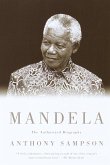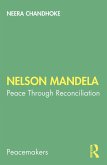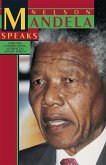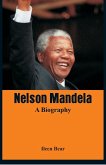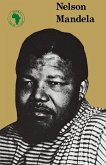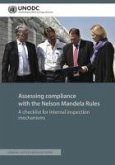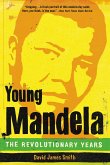Iu Press Journals
Nelson Rolihlahla Mandela 1918-2013
Transition: The Magazine of Africa and the Diaspora
23,99 €
inkl. MwSt.
Versandfertig in über 4 Wochen

12 °P sammeln
Iu Press Journals
Nelson Rolihlahla Mandela 1918-2013
Transition: The Magazine of Africa and the Diaspora
- Broschiertes Buch
- Merkliste
- Auf die Merkliste
- Bewerten Bewerten
- Teilen
- Produkt teilen
- Produkterinnerung
- Produkterinnerung
Alejandro de la Fuente is a historian of Latin America and the Caribbean who specializes in the study of comparative slavery and race relations. He is the founding Director of the Afro-Latin American Research Institute at Harvard University¿s Hutchins Center and the faculty cochair of Harvard University¿s¿Cuban Studies Program.
Andere Kunden interessierten sich auch für
![Mandela Mandela]() Anthony SampsonMandela25,99 €
Anthony SampsonMandela25,99 €![Nelson Mandela Nelson Mandela]() Neera ChandhokeNelson Mandela35,99 €
Neera ChandhokeNelson Mandela35,99 €![Nelson Mandela Speaks Nelson Mandela Speaks]() Nelson MandelaNelson Mandela Speaks15,99 €
Nelson MandelaNelson Mandela Speaks15,99 €![Nelson Mandela - A Biography Nelson Mandela - A Biography]() Ileen BearNelson Mandela - A Biography17,99 €
Ileen BearNelson Mandela - A Biography17,99 €![Nelson Mandela Nelson Mandela]() PanafNelson Mandela41,99 €
PanafNelson Mandela41,99 €![Assessing Compliance with the Nelson Mandela Rules Assessing Compliance with the Nelson Mandela Rules]() Assessing Compliance with the Nelson Mandela Rules31,99 €
Assessing Compliance with the Nelson Mandela Rules31,99 €![Young Mandela Young Mandela]() David James SmithYoung Mandela17,99 €
David James SmithYoung Mandela17,99 €-
-
-
Alejandro de la Fuente is a historian of Latin America and the Caribbean who specializes in the study of comparative slavery and race relations. He is the founding Director of the Afro-Latin American Research Institute at Harvard University¿s Hutchins Center and the faculty cochair of Harvard University¿s¿Cuban Studies Program.
Hinweis: Dieser Artikel kann nur an eine deutsche Lieferadresse ausgeliefert werden.
Hinweis: Dieser Artikel kann nur an eine deutsche Lieferadresse ausgeliefert werden.
Produktdetails
- Produktdetails
- Verlag: Indiana University Press
- Seitenzahl: 182
- Erscheinungstermin: 2. Februar 2015
- Englisch
- Abmessung: 251mm x 170mm x 8mm
- Gewicht: 318g
- ISBN-13: 9780253018250
- ISBN-10: 0253018250
- Artikelnr.: 42317104
- Herstellerkennzeichnung
- Libri GmbH
- Europaallee 1
- 36244 Bad Hersfeld
- gpsr@libri.de
- Verlag: Indiana University Press
- Seitenzahl: 182
- Erscheinungstermin: 2. Februar 2015
- Englisch
- Abmessung: 251mm x 170mm x 8mm
- Gewicht: 318g
- ISBN-13: 9780253018250
- ISBN-10: 0253018250
- Artikelnr.: 42317104
- Herstellerkennzeichnung
- Libri GmbH
- Europaallee 1
- 36244 Bad Hersfeld
- gpsr@libri.de
Alejandro de la Fuente is a historian of Latin America and the Caribbean who specializes in the study of comparative slavery and race relations. He is the founding Director of the Afro-Latin American Research Institute at Harvard University's Hutchins Center and the faculty cochair of Harvard University's Cuban Studies Program.
1 "Of Flesh and Blood"
An introduction from Transition's new editor, Alejandro de la Fuente
3 The Dance is Not Over
Nobel Prize winner Wole Soyinka claims Mandela as a semi-divine avatar, but
acknowledges the
attendant naïveté-particularly about the depths of human evil-that
sometimes came with occupying such a lofty position
14 Saying Goodbye to a Global Icon
Adam Habib, Vice-Chancellor of the University of the Witwatersrand,
suggests that the most respectful way to honor Mandela is to not lose sight
of either his political shortcomings or the most difficult demands his
humanitarian message makes of us
27 A Critic, in Retrospect
Though one of Mandela's staunchest critics, Xolela Mangcu is humble enough
to admit being star struck by the great man, but still insists on the
importance of infusing Mandela's anti-racial politics with a politics of
racial justice and black power
40 Compassion and Corruption
Constitutional law expert and public scholar Pierre de Vos recalls how his
life and the lives of countless Afrikaners were transformed by Mandela's
forgiveness, yet wonders whether Mandela's compassion may have ultimately
set the stage for a subversion of the rule of law
51 Discovering Mandela's Children
On a fellowship in South Africa with her family in tow, Warren Binford
examines post-colonial Africa's pursuit of stringent laws protecting the
rights of children, while reflecting upon the ideal of unity amidst
enduring post-apartheid inequities
67 "The Algerian Army Made Me a Man"
Abdeldjalil Larbi Youcef reveals startling facts about a little-known
period of Mandela's life, when he was on the lam in northern Africa and
received a short, yet formative, introduction to armed resistance from the
Algerian revolutionary forces
80 Some Monday for Sure Fiction
We pay homage to Nobel Prize laureate, ANC activist-and Mandela's
friend-Nadine Gordimer (1923-2014) with this story that she first published
in 1965 in the pages of Transition 18
98 A Snub for the Ages
Immediately following his release from prison, at a time when most of the
world was celebrating Mandela, Marvin Dunn tells of how the leader was
rebuffed by the city of Miami, where conservative Cubans and Jews took the
opportunity to air their political grievances
106 Robben Island University
Mandela was "the world's most famous (former) prisoner," and Aaron Bady
explores how prison served as a necessary prerequisite for political
leadership in much of post-colonial Africa, then asks us to consider in
what ways Mandela may still be imprisoned
120 To Think as a Boxer
Offering multiple ways of viewing a famous sculpture depicting a boxing
Mandela, Kurt Campbell explores not only what it means to imagine Mandela
as a boxer, but also reveals how a youth spent boxing might have shaped
Mandela's activism and political vision
128 Fists Poetry
by Paul Theroux
130 Nelson Mandela's Two Bodies
Addressing the ubiquity of images of Nelson Mandela, art historian Steven
Nelson suggests that these pictures allow the viewer to enter into a space
of hope and reconciliation for which Mandela has come to stand, even as
they risk obscuring our view of the real Mandela
143 The Watchmen
South African artist Jane Alexander's uncanny, life-sized
sculptures-despite their seeming inscrutability-have been embraced as some
of the most significant and evocative anti-apartheid art;
Transition presents a photo essay of Alexander's iconic works, with an
introduction by Rebecca VanDiver
148 History, Iconicity, and Love
Meghan Healy-Clancy shares an historian's review of two recent
Mandela-themed films, Mandela:
Long Walk to Freedom and Winnie Mandela, in which she critiques their
simplified representations of the anti-apartheid struggle and,
particularly, their inept handling of the roles women played in those
efforts
167 Mourning Mandela
With camera in hand, Christopher J. Lee took to the streets following the
death of Mandela to experience and document the ways that South Africans
were memorializing the passing of their hero away from the limelight of the
official state-sanctioned, celebrity-infused funeral
172 In the Village
Returning to his natal village in the same region that Mandela called home,
Hugo Canham talks with elderly residents to get their take on Mandela's
legacy and to ascertain whether they see themselves as participating in his
politics of hope
An introduction from Transition's new editor, Alejandro de la Fuente
3 The Dance is Not Over
Nobel Prize winner Wole Soyinka claims Mandela as a semi-divine avatar, but
acknowledges the
attendant naïveté-particularly about the depths of human evil-that
sometimes came with occupying such a lofty position
14 Saying Goodbye to a Global Icon
Adam Habib, Vice-Chancellor of the University of the Witwatersrand,
suggests that the most respectful way to honor Mandela is to not lose sight
of either his political shortcomings or the most difficult demands his
humanitarian message makes of us
27 A Critic, in Retrospect
Though one of Mandela's staunchest critics, Xolela Mangcu is humble enough
to admit being star struck by the great man, but still insists on the
importance of infusing Mandela's anti-racial politics with a politics of
racial justice and black power
40 Compassion and Corruption
Constitutional law expert and public scholar Pierre de Vos recalls how his
life and the lives of countless Afrikaners were transformed by Mandela's
forgiveness, yet wonders whether Mandela's compassion may have ultimately
set the stage for a subversion of the rule of law
51 Discovering Mandela's Children
On a fellowship in South Africa with her family in tow, Warren Binford
examines post-colonial Africa's pursuit of stringent laws protecting the
rights of children, while reflecting upon the ideal of unity amidst
enduring post-apartheid inequities
67 "The Algerian Army Made Me a Man"
Abdeldjalil Larbi Youcef reveals startling facts about a little-known
period of Mandela's life, when he was on the lam in northern Africa and
received a short, yet formative, introduction to armed resistance from the
Algerian revolutionary forces
80 Some Monday for Sure Fiction
We pay homage to Nobel Prize laureate, ANC activist-and Mandela's
friend-Nadine Gordimer (1923-2014) with this story that she first published
in 1965 in the pages of Transition 18
98 A Snub for the Ages
Immediately following his release from prison, at a time when most of the
world was celebrating Mandela, Marvin Dunn tells of how the leader was
rebuffed by the city of Miami, where conservative Cubans and Jews took the
opportunity to air their political grievances
106 Robben Island University
Mandela was "the world's most famous (former) prisoner," and Aaron Bady
explores how prison served as a necessary prerequisite for political
leadership in much of post-colonial Africa, then asks us to consider in
what ways Mandela may still be imprisoned
120 To Think as a Boxer
Offering multiple ways of viewing a famous sculpture depicting a boxing
Mandela, Kurt Campbell explores not only what it means to imagine Mandela
as a boxer, but also reveals how a youth spent boxing might have shaped
Mandela's activism and political vision
128 Fists Poetry
by Paul Theroux
130 Nelson Mandela's Two Bodies
Addressing the ubiquity of images of Nelson Mandela, art historian Steven
Nelson suggests that these pictures allow the viewer to enter into a space
of hope and reconciliation for which Mandela has come to stand, even as
they risk obscuring our view of the real Mandela
143 The Watchmen
South African artist Jane Alexander's uncanny, life-sized
sculptures-despite their seeming inscrutability-have been embraced as some
of the most significant and evocative anti-apartheid art;
Transition presents a photo essay of Alexander's iconic works, with an
introduction by Rebecca VanDiver
148 History, Iconicity, and Love
Meghan Healy-Clancy shares an historian's review of two recent
Mandela-themed films, Mandela:
Long Walk to Freedom and Winnie Mandela, in which she critiques their
simplified representations of the anti-apartheid struggle and,
particularly, their inept handling of the roles women played in those
efforts
167 Mourning Mandela
With camera in hand, Christopher J. Lee took to the streets following the
death of Mandela to experience and document the ways that South Africans
were memorializing the passing of their hero away from the limelight of the
official state-sanctioned, celebrity-infused funeral
172 In the Village
Returning to his natal village in the same region that Mandela called home,
Hugo Canham talks with elderly residents to get their take on Mandela's
legacy and to ascertain whether they see themselves as participating in his
politics of hope
1 "Of Flesh and Blood"
An introduction from Transition's new editor, Alejandro de la Fuente
3 The Dance is Not Over
Nobel Prize winner Wole Soyinka claims Mandela as a semi-divine avatar, but
acknowledges the
attendant naïveté-particularly about the depths of human evil-that
sometimes came with occupying such a lofty position
14 Saying Goodbye to a Global Icon
Adam Habib, Vice-Chancellor of the University of the Witwatersrand,
suggests that the most respectful way to honor Mandela is to not lose sight
of either his political shortcomings or the most difficult demands his
humanitarian message makes of us
27 A Critic, in Retrospect
Though one of Mandela's staunchest critics, Xolela Mangcu is humble enough
to admit being star struck by the great man, but still insists on the
importance of infusing Mandela's anti-racial politics with a politics of
racial justice and black power
40 Compassion and Corruption
Constitutional law expert and public scholar Pierre de Vos recalls how his
life and the lives of countless Afrikaners were transformed by Mandela's
forgiveness, yet wonders whether Mandela's compassion may have ultimately
set the stage for a subversion of the rule of law
51 Discovering Mandela's Children
On a fellowship in South Africa with her family in tow, Warren Binford
examines post-colonial Africa's pursuit of stringent laws protecting the
rights of children, while reflecting upon the ideal of unity amidst
enduring post-apartheid inequities
67 "The Algerian Army Made Me a Man"
Abdeldjalil Larbi Youcef reveals startling facts about a little-known
period of Mandela's life, when he was on the lam in northern Africa and
received a short, yet formative, introduction to armed resistance from the
Algerian revolutionary forces
80 Some Monday for Sure Fiction
We pay homage to Nobel Prize laureate, ANC activist-and Mandela's
friend-Nadine Gordimer (1923-2014) with this story that she first published
in 1965 in the pages of Transition 18
98 A Snub for the Ages
Immediately following his release from prison, at a time when most of the
world was celebrating Mandela, Marvin Dunn tells of how the leader was
rebuffed by the city of Miami, where conservative Cubans and Jews took the
opportunity to air their political grievances
106 Robben Island University
Mandela was "the world's most famous (former) prisoner," and Aaron Bady
explores how prison served as a necessary prerequisite for political
leadership in much of post-colonial Africa, then asks us to consider in
what ways Mandela may still be imprisoned
120 To Think as a Boxer
Offering multiple ways of viewing a famous sculpture depicting a boxing
Mandela, Kurt Campbell explores not only what it means to imagine Mandela
as a boxer, but also reveals how a youth spent boxing might have shaped
Mandela's activism and political vision
128 Fists Poetry
by Paul Theroux
130 Nelson Mandela's Two Bodies
Addressing the ubiquity of images of Nelson Mandela, art historian Steven
Nelson suggests that these pictures allow the viewer to enter into a space
of hope and reconciliation for which Mandela has come to stand, even as
they risk obscuring our view of the real Mandela
143 The Watchmen
South African artist Jane Alexander's uncanny, life-sized
sculptures-despite their seeming inscrutability-have been embraced as some
of the most significant and evocative anti-apartheid art;
Transition presents a photo essay of Alexander's iconic works, with an
introduction by Rebecca VanDiver
148 History, Iconicity, and Love
Meghan Healy-Clancy shares an historian's review of two recent
Mandela-themed films, Mandela:
Long Walk to Freedom and Winnie Mandela, in which she critiques their
simplified representations of the anti-apartheid struggle and,
particularly, their inept handling of the roles women played in those
efforts
167 Mourning Mandela
With camera in hand, Christopher J. Lee took to the streets following the
death of Mandela to experience and document the ways that South Africans
were memorializing the passing of their hero away from the limelight of the
official state-sanctioned, celebrity-infused funeral
172 In the Village
Returning to his natal village in the same region that Mandela called home,
Hugo Canham talks with elderly residents to get their take on Mandela's
legacy and to ascertain whether they see themselves as participating in his
politics of hope
An introduction from Transition's new editor, Alejandro de la Fuente
3 The Dance is Not Over
Nobel Prize winner Wole Soyinka claims Mandela as a semi-divine avatar, but
acknowledges the
attendant naïveté-particularly about the depths of human evil-that
sometimes came with occupying such a lofty position
14 Saying Goodbye to a Global Icon
Adam Habib, Vice-Chancellor of the University of the Witwatersrand,
suggests that the most respectful way to honor Mandela is to not lose sight
of either his political shortcomings or the most difficult demands his
humanitarian message makes of us
27 A Critic, in Retrospect
Though one of Mandela's staunchest critics, Xolela Mangcu is humble enough
to admit being star struck by the great man, but still insists on the
importance of infusing Mandela's anti-racial politics with a politics of
racial justice and black power
40 Compassion and Corruption
Constitutional law expert and public scholar Pierre de Vos recalls how his
life and the lives of countless Afrikaners were transformed by Mandela's
forgiveness, yet wonders whether Mandela's compassion may have ultimately
set the stage for a subversion of the rule of law
51 Discovering Mandela's Children
On a fellowship in South Africa with her family in tow, Warren Binford
examines post-colonial Africa's pursuit of stringent laws protecting the
rights of children, while reflecting upon the ideal of unity amidst
enduring post-apartheid inequities
67 "The Algerian Army Made Me a Man"
Abdeldjalil Larbi Youcef reveals startling facts about a little-known
period of Mandela's life, when he was on the lam in northern Africa and
received a short, yet formative, introduction to armed resistance from the
Algerian revolutionary forces
80 Some Monday for Sure Fiction
We pay homage to Nobel Prize laureate, ANC activist-and Mandela's
friend-Nadine Gordimer (1923-2014) with this story that she first published
in 1965 in the pages of Transition 18
98 A Snub for the Ages
Immediately following his release from prison, at a time when most of the
world was celebrating Mandela, Marvin Dunn tells of how the leader was
rebuffed by the city of Miami, where conservative Cubans and Jews took the
opportunity to air their political grievances
106 Robben Island University
Mandela was "the world's most famous (former) prisoner," and Aaron Bady
explores how prison served as a necessary prerequisite for political
leadership in much of post-colonial Africa, then asks us to consider in
what ways Mandela may still be imprisoned
120 To Think as a Boxer
Offering multiple ways of viewing a famous sculpture depicting a boxing
Mandela, Kurt Campbell explores not only what it means to imagine Mandela
as a boxer, but also reveals how a youth spent boxing might have shaped
Mandela's activism and political vision
128 Fists Poetry
by Paul Theroux
130 Nelson Mandela's Two Bodies
Addressing the ubiquity of images of Nelson Mandela, art historian Steven
Nelson suggests that these pictures allow the viewer to enter into a space
of hope and reconciliation for which Mandela has come to stand, even as
they risk obscuring our view of the real Mandela
143 The Watchmen
South African artist Jane Alexander's uncanny, life-sized
sculptures-despite their seeming inscrutability-have been embraced as some
of the most significant and evocative anti-apartheid art;
Transition presents a photo essay of Alexander's iconic works, with an
introduction by Rebecca VanDiver
148 History, Iconicity, and Love
Meghan Healy-Clancy shares an historian's review of two recent
Mandela-themed films, Mandela:
Long Walk to Freedom and Winnie Mandela, in which she critiques their
simplified representations of the anti-apartheid struggle and,
particularly, their inept handling of the roles women played in those
efforts
167 Mourning Mandela
With camera in hand, Christopher J. Lee took to the streets following the
death of Mandela to experience and document the ways that South Africans
were memorializing the passing of their hero away from the limelight of the
official state-sanctioned, celebrity-infused funeral
172 In the Village
Returning to his natal village in the same region that Mandela called home,
Hugo Canham talks with elderly residents to get their take on Mandela's
legacy and to ascertain whether they see themselves as participating in his
politics of hope

